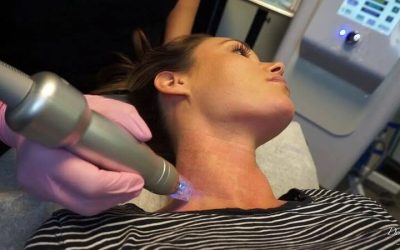Hormonal imbalances are common among women at various stages of life, from puberty through menopause and beyond. These imbalances can have a significant impact on a woman’s physical, emotional, and mental well-being. As hormones play a crucial role in regulating everything from metabolism and mood to fertility and sexual function, even slight imbalances can lead to a wide range of symptoms.
Fortunately, female hormone replacement therapy (HRT) and bioidentical hormone therapy for women offer effective solutions to restore hormonal balance and alleviate these disruptive symptoms.
Let’s explore the symptoms and causes of hormonal imbalance in women, as well as how hormone therapy can help address the underlying issues.
What Is Hormonal Imbalance in Women?
Hormonal imbalance occurs when the body produces too much or too little of a hormone, disrupting the normal function of bodily systems. In women, the most common hormones affected include estrogen, progesterone, testosterone, and thyroid hormones. When these hormones are out of balance, it can result in physical, emotional, and cognitive symptoms that can affect a woman’s overall health.
Common Symptoms of Hormonal Imbalance in Women
Hormonal imbalances can cause a wide variety of symptoms, which can vary depending on which hormones are involved. Some of the most common signs of hormonal imbalance in women include:
- Irregular periods: Changes in menstrual cycle length, frequency, or intensity.
- Hot flashes: Sudden, intense feelings of heat, often accompanied by sweating, common during menopause.
- Fatigue: Constant tiredness or lack of energy, even after rest.
- Mood swings: Irritability, anxiety, or feelings of sadness and depression.
- Weight gain: Unexplained weight gain, particularly around the abdomen.
- Decreased libido: Reduced interest in sexual activity, often associated with low estrogen or testosterone levels.
- Sleep disturbances: Difficulty falling or staying asleep, especially during menopause.
- Dry skin and hair: Thinning or drying of the skin and hair as a result of hormonal fluctuations.
- Memory issues: Difficulty concentrating or experiencing brain fog.
These symptoms are often associated with certain stages of life, such as perimenopause and menopause, but hormonal imbalances can occur at any age due to factors like stress, pregnancy, or thyroid dysfunction.
Common Causes of Hormonal Imbalance in Women
Several factors can lead to hormonal imbalance in women, including:
1. Perimenopause and Menopause
As women approach menopause, typically in their late 40s to early 50s, they experience significant hormonal fluctuations. During this time, estrogen and progesterone levels decline, leading to common symptoms such as hot flashes, mood swings, and irregular periods. This period, known as perimenopause, can last several years before menopause is reached, which marks the end of menstruation.
2. Pregnancy and Postpartum Period
Pregnancy is another time when a woman’s hormones fluctuate dramatically. After childbirth, women may also experience hormonal shifts as their bodies return to a pre-pregnancy state. These changes can lead to symptoms such as postpartum depression, fatigue, and changes in menstrual cycles.
3. Thyroid Dysfunction
Thyroid hormones, which help regulate metabolism, can also become imbalanced. Conditions such as hypothyroidism (underactive thyroid) and hyperthyroidism (overactive thyroid) can result in weight gain, fatigue, hair thinning, and other symptoms of hormonal imbalance.
4. Polycystic Ovary Syndrome (PCOS)
PCOS is a common condition in which women produce higher-than-normal levels of male hormones (androgens), leading to irregular periods, weight gain, acne, and excessive hair growth.
5. Stress
Chronic stress can lead to an overproduction of cortisol, the body’s primary stress hormone. High cortisol levels can disrupt the balance of other hormones, leading to symptoms such as weight gain, anxiety, and sleep disturbances.
6. Medications
Certain medications, such as birth control pills, antidepressants, or hormone therapy, can interfere with the natural hormonal balance. These medications can alter estrogen, progesterone, and testosterone levels, contributing to imbalance.
7. Lifestyle Factors
Poor diet, lack of exercise, and insufficient sleep can also impact hormone levels. Obesity, for example, can increase estrogen production, which may contribute to hormonal disruptions.
Solutions for Hormonal Imbalance in Women
When it comes to managing hormonal imbalance, there are various treatment options available, with female hormone replacement therapy (HRT) and bioidentical hormone therapy for women being two of the most effective. These therapies help restore the balance of hormones and alleviate symptoms that can affect a woman’s daily life.
Female Hormone Replacement Therapy (HRT)
HRT is a medical treatment used to supplement estrogen and progesterone levels in women who are experiencing hormonal imbalances, particularly during perimenopause and menopause. By restoring these hormones, HRT can alleviate many common symptoms, including hot flashes, night sweats, and mood swings.
There are different types of hormone therapy, including:
- Estrogen-only therapy: Often recommended for women who have had a hysterectomy.
- Combination therapy: A combination of estrogen and progesterone, often recommended for women with a uterus to prevent uterine cancer.
While HRT is highly effective, it should be used under the guidance of a healthcare provider to ensure safety and minimize potential risks.
Bioidentical Hormone Therapy for Women
Bioidentical hormone therapy for women involves the use of hormones that are chemically identical to those naturally produced by the body. These hormones are typically derived from plant sources and are customized to meet each woman’s individual needs.
Bioidentical hormone therapy is often preferred by women seeking a more natural alternative to synthetic hormones. Because bioidentical hormones are closely aligned with the body’s own chemistry, they are generally believed to be safer and more effective for many women.
Bioidentical hormones are often used to treat symptoms associated with menopause, perimenopause, and hormonal imbalances, such as low libido, hot flashes, mood swings, and irregular periods. Many women find that this therapy provides significant relief and improves their overall quality of life.
Final Thoughts
Hormonal imbalance is a common issue for women at various stages of life, and it can lead to a range of disruptive symptoms. Fortunately, treatments such as female hormone replacement therapy and bioidentical hormone therapy for women offer effective solutions for restoring hormonal balance and improving overall well-being.
If you’re struggling with symptoms of hormonal imbalance, it’s essential to consult with a healthcare provider who can guide you through the treatment options available. Optimal Female and Men’s Wellness serves as a reliable partner in providing personalized hormone therapy solutions tailored to your specific needs.


